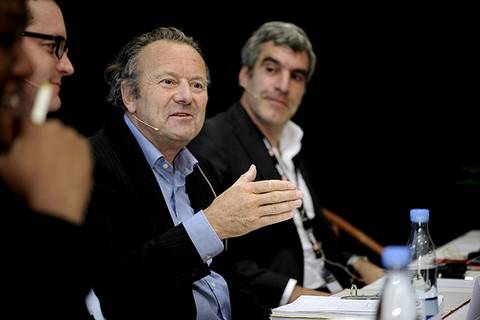During the conference in Aarhus which I attended a month ago, not surprisingly the reform process at FIFA was prominent on the agenda. It was the topic for a major plenary session and it caused several additional debates. As I noted in a couple of my own interventions, what happens in FIFA is extremely important well beyond the world of football. It is the dominating sport in the world, with more media exposure and supporter interest than any other sport, and there are vast amounts of money involved, both in the major international events and at the national level.
So the problems with corruption and terrible mismanagement of the operations and the vast resources of FIFA constitute a concern for the image of all sports and serve as a bad example and an excuse for many other sports, such as handball. It is disgraceful to hear the IHF president proudly talk about Sepp Blatter as a role model. Many of the perennial problems with FIFA involve abuse of power and bribery at a personal level among its top figures. The biggest scandal involved the FIFA marketing partner ISL, through which millions of dollars were paid in bribes to senior officials in FIFA (and the IOC). Former FIFA President Havelange, and Executive members Teixeira, Leoz and Hayatou were among the main recipients of illicit payments. President Blatter has somehow managed to ensure a lack of evidence against him.
In separate scandals related to the election of the FIFA Executive Committee and the bidding for the hosting of the World Cup, two other top figures Bin Hammam and Warner got caught more recently. But the corruption is much more widespread, and the far from democratic election procedures and the bribery-prone processes for the selection of World Cup hosts were always based on shady practices. The sudden idea of selection hosts for 2018 and 2022 at the same time caused the culmination of shenanigans and accusations. When Qatar and Russia, whose resources seemed to be as unlimited as their ambitions, came out as the winners ahead of the favored candidates, then ‘all hell broke loose’. And the notion of playing a World Championship in the heat of the summer was perhaps the real trigger for suspicions and protests.
So in 2011, FIFA found it necessary to establish, with great fanfare, a temporary Independent Governance Committee (IGC) to oversee the creation of a framework for good governance and controls. Some recommendations were already accepted at the FIFA Congresses in 2012 and 2013, and others are supposedly planned to follow. But the whole process has been controversial and the sincerity has been questioned. An intended key player, Transparency International, bailed out from the process almost at the outset, because they did not want to risk their reputation by ‘being involved in a process lacking in credibility’. The Chair of ICG, Mark Pieth, was initially enthusiastic and optimistic, but when he now spoke at ‘Play the Game’, just before his affiliation with FIFA is ending, he sounded rather more frustrated and said that ‘he had overestimated FIFA’s will for change’!
So what has then been achieved so far? A Code of Ethics and a supposedly independent Ethics Committee, with separate investigatory and adjudicatory chambers, have been established. The structure and resources are in place, and FIFA wants to note that the first investigations of misconduct have already been concluded with sanctions as a result. But the true power and real independence can only be assessed over the longer term. A revised Audit & Compliance Committee is now in place, with an experienced outsider in charge, and a confidential reporting mechanism (‘whistleblower hotline’) has been activated. Integrity checks for key officials have been approved. Apart from these structural aspects, FIFA also emphasizes that, for the first time, a woman has been elected (and two more women have been ‘co-opted’) to the Executive Committee. But observers note that, on a scale from 0 to 100, these measures only bring FIFA to about 50-55 in terms of overall good governance practices. Even if all the ICG recommendations one day were to be implemented, it would only bring FIFA to mediocre level of 70, i.e., just short of the rating for the IOC, not exactly a model of excellence in this respect…
Among the many ICG recommendations which have not been implemented, one could mention term limits for the Executive, a committee with external participation that would overlook FIFA compensation practices, salary disclosure, adoption of best-practice anti-corruption standards, guidelines for avoiding conflicts of interest, financial disclosures at all levels of FIFA and its members organizations, transparency in investigatory processes, and adoption of democratic procedures in FIFA election processes. These are of course rather fundamental aspects of good governance, and the observed reluctance among FIFA Executives, and particularly Blatter himself, to move ahead on these fronts is quite telling. Where does this then leave us, in an organization that remains under the firm control of a very tight ‘old boys’ network’ and with a president who does not wish to deny his interest in running for re-election yet again in 2015?
With the ICG recommendations left in the hands of these persons, who have shown no genuine interest in affecting major change, in reducing their personal enrichment, or in shedding light on past problems, how optimistic can one be!? There are many ‘skeletons in the closet’, for instance from the ISL scandal, and many FIFA Executives are likely to be desperate to keep the lid on. In fact, one of the main objections from Transparency International was precisely FIFA’s refusal to investigate unresolved problems from the past. Even the FIFA Communications Director, Walter de Gregorio, who was present in Aarhus and had a hard time in putting the right spin on matters from a FIFA perspective, admitted that “FIFA made a lot of mistakes in the past”. Can the reform process really be credible, if the decision-makers refuse to own up to these mistakes?

